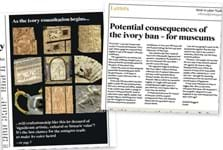Accordingly, we are seeking counsel’s opinion not only as to the way the ‘consultation’ was phrased, conducted and concluded but also as to whether the intended legislation in fact contravenes human rights legislation.
By this we mean the government is effectively confiscating, without compensation, all value from owners of sculpted ivory that is less than 100 years old.
If any of your readers would be prepared to assist us financially, to pursue this matter, we would be extremely grateful.
Protecting sculpture
By way of explanation, we are a small charity, one of whose missions is to encourage excellence in and the study and protection of sculpture.
We are currently recording and publishing the public sculpture of the UK, a project now over 70% completed.
This is why we feel it is our duty to oppose the extent of the proposed legislation by Defra banning the sale or purchase of historic elephant ivory.
No persuasive evidence whatsoever has been produced that criminalising the sale or purchase of old sculpted ivory would deter poachers in Africa or reduce demand from India, the Far or Middle East.
All this said, we would entirely support a stand taken by the government on this matter which would involve heavy penalties for those dealing with ivory taken from elephants who lived during a given period of years up to the present.
It is unfortunate that the present proposals, on the back of a consultation where the questions gave the impression of seeking justification for a decision already taken, was no consultation at all and had the flavour more of a ‘show trial’ than a genuine wish to hear from those affected.
Celebrity campaign
And, at the end, Defra could only point to some 0.01% of the population which they claimed as justifying their current extreme proposals, resulting presumably from a highly organised and well-funded public campaign by celebrities to promote a total ban.
The consequences will also include:
• The destruction or loss of thousands of fine sculpted works in ivory which will be rendered valueless as they will not meet the exceptionally high criteria demanded of the limited exceptions to the proposed ban.
• A substantial disadvantage to the British art market against the growing competition from Paris where there are not the problems proposed for the UK fairs and auctions.
• The confiscation of value, with no compensation, from many possessors of ivory sculpture, whether brought back by those who fought for us abroad, inherited or purchased when works in ivory were highly regarded.
• A considerable increase in bureaucracy involved in certifying the limited exceptions to the proposed ban.
John Lewis OBE
Chairman, The Public Monuments & Sculpture Association













